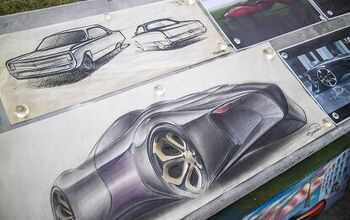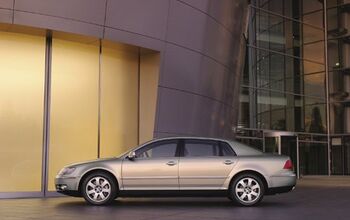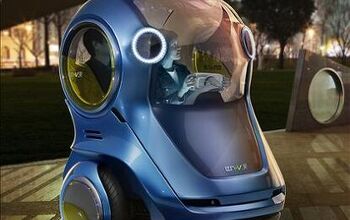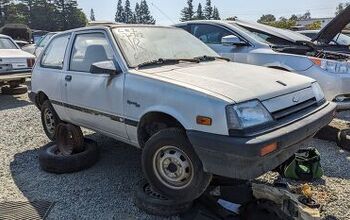The Car of the Future
I’ve seen the car of the future. It's not a diesel. It’s not a hybrid. It doesn’t run on electricity or natural gas or elastometric energy storage units recharged by rodents operating exercise wheels, supervised by domesticated felines. The future is sitting in a corner of your local Ford dealer's showroom gathering dust: a Ford Focus with the optional 2.0 E engine. This little runner is what’s called a PZEV (Practically Zero Emissions Vehicle). That's a cut better than a ULEV (Ultra Low Emissions Vehicle) but not quite as good as a ZEV (Zero Emissions Vehicle). Ah, but the Focus E is still the best a tree hugger can get.
If you think about it (a rare activity for people who focus more on politics than scientific facts), a Focus PZEV has less environmental impact than an electric-powered ZEV. The ZEV rating measures only tailpipe emissions– not a vehicle’s the total impact on the environment. Consider the infrastructure that supplies the energy for the electric car. Plug in an EV-1 every night, and someone throws on more coal at the powerplant. In many cities, a PZEV car like the Focus E emits exhaust that is cleaner than the air it consumes. In fact, creating instruments to measure the miniscule amounts of pollution from a PZEV car is a growth industry, and a real technological challenge.
Ford's joined in this technological accomplishment by BMW (325ci), Honda (Civic GX), Hyundai (Elantra), KIA (Spectra), Mazda (Mazda3 2.0), Mercedes (E350), Mitsubishi (Galant), Nissan (Sentra), Subaru (Legacy 2.5), Toyota (Camry), Volkswagen (Golf) and Volvo (V70); to name but a few makes and models.
[GM is notably absent from the list of automakers building PZEV vehicles. For 20 years, GM offered the most fuel-efficient cars in America. Starting with the Vega through to the three cylinder GEOs of the ‘80’s and ‘90’s and the EV-1 electric car, GM spent a great deal of money to top the EPA's mileage list. All these cars had one thing in common: no one bought them. Eventually GM gave up this unprofitable pursuit. While GM cars usually have the highest mileage in their respective categories, The General only makes a token effort (e.g. the Saturn VUE hybrid) to compete with high-mileage “loss leaders” like the Civic or Prius.]
Of course, the gasoline-powered, internal combustion engine hasn’t finished cleaning up its act. Every year, the old dear gets a little better. Evolving technology– direct injection, semi-stratified charge combustion, higher operating temperatures, more reductions in internal friction, etc. — promises even cleaner and more fuel efficient cars in the future. None of this is "news" in the media's view. A cumulative 2% improvement in efficiency year on year doesn't make nearly as good a story as fuel cells, hybrids or diesels. But spread this incremental improvement over 20 years and tens of millions of vehicle and the cumulative effect– in terms of the engines' overall environmental impact– is astounding.
There is a single but significant fly in the near-organic ointment: Americans don't buy fuel-efficient cars. No matter how much the general public complains about the price of gas or the planet’s ascending temperature, the cleanest and most fuel efficient cars are often the most unloved. The media never misses an opportunity to chronicle the "skyrocketing" sales of hybrids, but fails to point out that they're a relatively obscure breed. Last year, total hybrid sales captured around 3% of the new car market. Toyota sells more SUVs than that. Since Toyota and others lose anywhere from $2k to $4k per car on their low-end hybrids, there is little incentive to drastically increase production and sales. No wonder Bill Ford has pulled back from his public commitment to produce 250k hybrid-powered vehicles by the end of [this] decade.
So why do carmakers offer money-losing high mileage cars? They have no choice. As we’ve discussed here before, every car manufacturer has to meet a CAFÉ (Corporate Average Fuel Economy) number. If Ford wants to sell Lincoln Navigators at a $10,000 markup without incurring a substantial EPA fine and/or negative PR fallout, they need a produce a passel of PZEV Foci to boost their fleet average– whether they sell or not. Every carmaker suffers this problem. Toyota chooses to lose their money on hybrids, and reap some positive PR. BMW pays the fines. Ford, GM, Chrysler and others suffer in silence.
Few things are certain. But the most likely scenario for the car of the future is that it will be a lot like today's Ford Focus (minus the strange taillights, we hope). It’ll be relatively small and simple, with an extremely sophisticated internal combustion engine. And, no doubt, gathering dust in the corner of the showroom, while buyers flock to the latest gas-guzzler, and pundits bemoan the state of the nation's oil consumption.
More by Bob Elton
Latest Car Reviews
Read moreLatest Product Reviews
Read moreRecent Comments
- Bkojote Allright, actual person who knows trucks here, the article gets it a bit wrong.First off, the Maverick is not at all comparable to a Tacoma just because they're both Hybrids. Or lemme be blunt, the butch-est non-hybrid Maverick Tremor is suitable for 2/10 difficulty trails, a Trailhunter is for about 5/10 or maybe 6/10, just about the upper end of any stock vehicle you're buying from the factory. Aside from a Sasquatch Bronco or Rubicon Jeep Wrangler you're looking at something you're towing back if you want more capability (or perhaps something you /wish/ you were towing back.)Now, where the real world difference should play out is on the trail, where a lot of low speed crawling usually saps efficiency, especially when loaded to the gills. Real world MPG from a 4Runner is about 12-13mpg, So if this loaded-with-overlander-catalog Trailhunter is still pulling in the 20's - or even 18-19, that's a massive improvement.
- Lou_BC "That’s expensive for a midsize pickup" All of the "offroad" midsize trucks fall in that 65k USD range. The ZR2 is probably the cheapest ( without Bison option).
- Lou_BC There are a few in my town. They come out on sunny days. I'd rather spend $29k on a square body Chevy
- Lou_BC I had a 2010 Ford F150 and 2010 Toyota Sienna. The F150 went through 3 sets of brakes and Sienna 2 sets. Similar mileage and 10 year span.4 sets tires on F150. Truck needed a set of rear shocks and front axle seals. The solenoid in the T-case was replaced under warranty. I replaced a "blend door motor" on heater. Sienna needed a water pump and heater blower both on warranty. One TSB then recall on spare tire cable. Has a limp mode due to an engine sensor failure. At 11 years old I had to replace clutch pack in rear diff F150. My ZR2 diesel at 55,000 km. Needs new tires. Duratrac's worn and chewed up. Needed front end alignment (1st time ever on any truck I've owned).Rear brakes worn out. Left pads were to metal. Chevy rear brakes don't like offroad. Weird "inside out" dents in a few spots rear fenders. Typically GM can't really build an offroad truck issue. They won't warranty. Has fender-well liners. Tore off one rear shock protector. Was cheaper to order from GM warehouse through parts supplier than through Chevy dealer. Lots of squeaks and rattles. Infotainment has crashed a few times. Seat heater modual was on recall. One of those post sale retrofit.Local dealer is horrific. If my son can't service or repair it, I'll drive 120 km to the next town. 1st and last Chevy. Love the drivetrain and suspension. Fit and finish mediocre. Dealer sucks.
- MaintenanceCosts You expect everything on Amazon and eBay to be fake, but it's a shame to see fake stuff on Summit Racing. Glad they pulled it.


































Comments
Join the conversation
Almost all of the comments miss the point of this article. It's not about CO2, NOx, etc. It's about the fact that there is no new or exotic technology required to drastically reduce the impact of the automobile on the environment. Just a change in attitudes. And, judging from the response to the article, there is little chance of that. Bob
Just checking back in ... I think we're on different wavelengths in these comments Bob. I already own a Prius, and I leave it in the garage a lot, as I walk and ride my bicycle. Don't tell me about missing the point, when I've got thousands of miles on my bicycles. Now, my comment above was to call out that comment about EVs and pollution (of any type) per mile. Is that defended somewhere? Or just gleaned from some oil/car company's PR material?